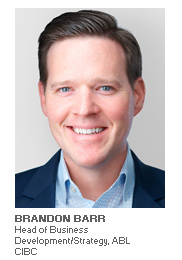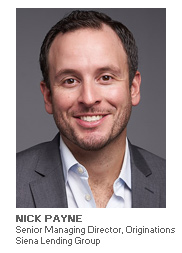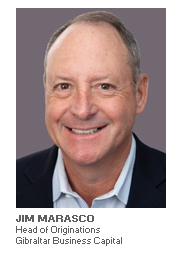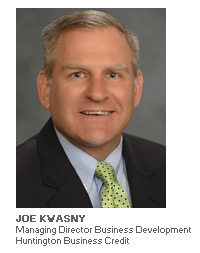
In this new feature, Charlie Perer meets with national originations executives to discuss the state of new business origination in the commercial finance industry, the dynamic nature of the role and general market dynamics. The purpose of this series is to hear from a group of leaders who focus specifically on transaction originations and manage BDO teams to gather their market views and how they are positioning their business for success.
Here to tell the story are Jim Marasco of Gibraltar Business Capital, Nick Payne of Siena Lending Group, Brandon Barr of CIBC US Asset-Based Lending and Joe Kwasny of Huntington Business Credit.
Charlie Perer: Please briefly introduce yourselves.

Brandon Barr: I lead originations and underwriting for CIBC’s US Asset-based Lending (ABL) Group. I started my career at LaSalle Bank here in Chicago, and have been with CIBC since 2011 (previously, The PrivateBank). I’ve been fortunate to have worked in several areas across the banking landscape from workout, lender finance, private banking and ABL. It’s been a bit of a non-traditional ABL path, but I believe it fits today’s environment where creativity wins, and a broad understanding of bank capabilities is valuable.
Joe Kwasny: I am Joe Kwasny, and I am Senior Vice President and Managing Director of Business Development for Huntington Business Credit (HBC), the asset-based lending division of Huntington National Bank. My entire 37-year career has been in banking, of which the last ten years have been in ABL and twenty in numerous management roles. I’ve held leadership roles in asset-based lending, floorplan lending, specialty finance lending, retail industry lending, large corporate and middle-market banking.
Jim Marasco: I joined Gibraltar Business Capital (GBC) as Head of Originations in April 2023. GBC is a non-bank lender owned by Hercules Capital. (Previously, I held a similar role at Wells Fargo Capital Finance, managing a national team of originators and syndication professionals. I started my sales career as a BDO at Foothill Capital Corporation and earned elevated roles in leadership and management over three decades with the company.

Nick Payne: I joined Siena Lending Group in 2015 as a Senior Vice President for originations and was immediately tasked with launching the Midwest market. I now currently help lead the origination efforts for the platform. Siena is a non-bank commercial finance company owned by Benefit Street Partners, providing asset-based loans between $10 and $100 million to small and middle market businesses across the United States and Canada. Prior to Siena, I launched the Midwest market for Nations Equipment Finance (now SLR Equipment Finance) and worked for Van Eck Global in their PWM and RIA sales channels. I started my career at Morgan Stanley in their Equity Sales and Trading division.
Perer: How would you describe your role overseeing national originations?

Marasco: I see my role as a coach, mentor and motivator for my team. In this capacity, I guide their calling efforts, make joint sales calls and work with them to evaluate and structure prospective transactions. I place a ton of trust in my well-trained team; knowing that they are calling and communicating actively and transparently with financial sponsors, the referral community and their prospects. Further, I serve as the link between originations and credit, providing transaction support during all phases of the deal process.
Kwasny: My job is to ensure we are appropriately covering the nation and positioning Huntington Business Credit for identifying and onboarding new client relationships. This includes being a recruiter, attracting the right business development talent and positioning them for success with a tailored strategic marketing plan for their specific markets. It also requires being hands-on to assist with targeted calling efforts and pitching and negotiating new credit structures. Lastly, and the least glamorous task is serving as administrator and internal bank ambassador for the marketing, new business development and sales efforts of Huntington Business Credit.
Barr: Given my varied background, my role is two-fold: First, I bring the full background of bank capabilities and industry expertise to our markets where our business development officers compete. Second, I work with our highly experienced, well-networked team to execute efficiently with an eye towards long-term relationship development. I learned early in my career at LaSalle Bank that everyone you meet is a potential client, prospect or referral source and you should engage in each discussion with a goal of bringing your network to theirs.
Perer: How has this role evolved over the past ten years and how is it going to evolve in the next ten?

Kwasny: The addition of non-bank lenders in the market has required asset-based lenders to be more creative in competing and winning new business. The growth of HBC has required strategic hiring to support a national calling effort. As a national group, training, developing culture and empowering new hires for success is critical to deliver a consistent service level.
Marasco: This has always been my approach, and it will likely not change significantly over the next decade. More than anything, I think it is imperative to provide senior leadership presence to support the originators in their interactions with deal sources, sponsors, prospects and internal stakeholders.
Barr: Each financial institution takes a slightly different view towards a national originations role. I envision this role evolving into a connector across the bank’s entire national footprint where I need to understand the competitive advantages across all facets of our U.S. and Canadian businesses, not just asset-based lending. CIBC offers best-in-class services that meet the unique needs of the private economy in the U.S. from ABL to equipment finance, investment banking, specialty finance, innovation banking and private wealth – just to name a few. My focus over the next ten years will be to further connect these services to our prospects, clients and referral sources as each company has unique needs that aren’t always solved with a singular focus.
Perer: What is your team’s go-to-market approach?
Barr: We have various channels that we cover from private equity, turnaround consultants, investment banks, direct calling and our commercial partners. As the market shifts, we place emphasis on different channels. It is important to have key centers of influence in each channel that provide quality and sound market insight as to what they are seeing and when. Those relationships also help you “look around the corner” before others get there.
Payne: Siena is and has been a believer in a relationship-driven marketing approach. We rely heavily on the relationships that our BDOs have built and cultivated, in some cases, for decades. We take seriously our responsibility to communicate early, often, and effectively and to execute on expressed terms.
In addition, we are believers in the ‘shotgun’ approach with referral sources. We cast wide nets and strive to develop relationships with individuals in varying professions that may play a key role in an ABL transaction.
Kwasny: Our go-to-market approach is built on the experience of our team, our speed to market, and by providing our clients and prospects with access to decision-makers. Our core team at Huntington Business Credit have been working together for over 20 years. Prospects and clients notice the familiarity we have with each other and recognize the confidence in our conversations regarding credit structure, industry experience or general inquiries. Often, we can finish each other’s sentences. This is re-assuring and an important part of building rapport and trust with a client or prospect.
While Huntington Business Credit has grown, we have maintained a flat organization and leadership structure. This translates to SPEED in getting out proposal letters, responding to requests and closing deals. It’s our flat organizational structure that allows us to introduce decision makers to our clients and prospects.
Marasco: With a small team of originators placed in most of the major markets, we maintain a traditional, regional coverage model. From there, we tailor our calling efforts based on conditions in each geographical market. We focus calling efforts and media campaigns on the most active areas: turnarounds, acquisitions, growth financing, or bank refinancing based on the trends we monitor. Serving the financial sponsor community is our major focus and has yielded great results for our clients and our firm.
Perer: Is the focus on establishing lending verticals a positive for BDOs long-term or does it just narrow a generalist’s calling effort?
Kwasny: It is a positive. We are at our best when we provide insight to help our clients achieve their goals. By combining industry expertise with asset-based lending expertise, we deliver a more comprehensive and value-added solution. This value-add results in a stronger client/bank relationship, which is our goal. We are privileged to have many long-standing relationships that choose to remain with Huntington Business Credit in an extremely competitive marketplace.
Marasco: Some lending verticals are necessary because specific industries require expertise and a specialized monitoring approach. Healthcare, retail and tech require deep industry knowledge and constant attention to understand the dynamics. We don’t employ a vertical strategy. Instead, we avoid only a few industries where we lack the expertise to lend, such as healthcare. A vertical approach can divert a BDO's time from maintaining a more balanced, generalist coverage plan. And when their assigned vertical is not “hot,” they are challenged to re-establish deal flow from generalist sources.
Barr: We are generalists by nature and not vertical-specific. It provides us with proper granularity by industry and geography, as well as a better view towards risk management when you step back and look at the portfolio as a whole. Our team – BDOs included – have built a very sound reputation within the ABL space. We have a reputation as being fair, pragmatic lenders who view a situation through the eyes of the owner.
In addition, we have a portion of our portfolio dedicated to early-stage turnarounds. While we have successfully used this “bucket” for 20-plus years, we believe it will continue to be utilized effectively in the current market environment. This portfolio carve-out provides the opportunity for us to compete against our non-bank ABL peers that have grown to be fierce competitors over the past ten years.
Payne: Verticals can be the right approach for the right team. Size of team is a key consideration. Many non-bank ABL teams run very lean. It’s just a part of their model. For those lenders, specificity may not be as valuable since the focus is really on consistent coverage and casting wide(r) nets. For the BDO, I would argue that specificity certainly doesn’t hurt you. You can get really smart in an industry, say aerospace, but still be effective on retail deals. Now when that aerospace opportunity comes along, you are going to impress on calls with the management team and referral source. That is going to help you build rapport and ultimately be a consideration in the sale. So long as being an ‘expert’ in one vertical doesn’t preclude the BDO from being a ‘generalist’ in another, then I think it’s in everyone’s best interest within the organization to promote proficiency within a vertical.
Perer: What is the biggest misperception regarding the role of a BDO?
Barr: The biggest misperception is BDOs are not credit focused. Our best and brightest BDOs originate with their credit hats on. They mitigate risk effectively, patiently structure and push where necessary. Our BDOs are formally credit trained and use that base of knowledge effectively to identify risk, mitigate it, and highlight those structural elements to our internal constituents before negotiating with the client.
Kwasny: I would point out two that I frequently encounter: One is that deals are just handed to BDO’s – or “fall from the sky.” To be successful as a BDO, you must be diligent and disciplined in your calling efforts and developing your value proposition. Only through these efforts are you going to have a successful long-term career. The second misperception is that successful BDO’s are “sales guys” or “bird dogs.” To be successful as a BDO, you must understand the credit features and benefits of an ABL facility. The ABL BDO needs to be able to educate and articulate the features/benefits of an ABL solution and how it will support the company’s working capital needs.
Marasco: Some people think BDOs are just “bird dogs,” looking for leads and then flipping packages into their companies for others to evaluate and execute. Successful BDOs have strong credit skills and can provide end-to-end solutions. A strong BDO can dig in and quickly understand the credit issues in a deal, determine if it fits the organization’s credit parameters, clearly explain the opportunity internally, and deliver the appropriate structure to the prospect.
Payne: That we’re out here having fun all day, or that the job is easy. Sure, the role can be fun but so can any other role. This job is tough. The people need to be tough. It’s not easy to get the stuffing beat out of you on a deal one day and then the very next day walk into a room full of people (including your competitor to whom you lost the deal) with a smile on your face, ready to tell a funny story. This is a grind and the people who do it day-in and day-out should be commended for their efforts.
Perer: What are the areas in which most BDOs fall short (i.e., networking, credit, etc.)?
Kwasny: If it was only that easy! We all have our own strengths and weaknesses, whether it be the depth of our network, drive, ambition, knowledge, credit, or some other attribute. But our most successful BDO’s leverage and lean into their strengths, and just as importantly are aware enough to use internal resources to assist in the areas they are not as skilled.
Marasco: A frequent weakness I’ve seen is a lack of experience and interest in understanding due diligence requirements to underwrite and approve new transactions. Also, many BDOs have not had sufficient exposure to legal documentation and the negotiation of intercreditor agreements. Another important element of a BDO's success is to have a strong grasp of the product they can deliver. It is not easy to be successful if you do not understand what your organization is willing to do or if you cannot accurately and confidently translate that to sponsors, referral sources and prospects.
Barr: All BDOs and bankers alike have areas where they are strongest and areas requiring improvement. That is why within our team we seek to have a balanced, team approach to new deal reviews and execution. Given our ABL team is an intentionally flat organization, we have decision makers involved at an early stage to review a deal all the way through credit approval and funding. This gives our BDOs the opportunity to understand our initial appetite for a new transaction, what diligence items we believe our credit partners are going to focus on and what portfolio history we have with the existing industry, structure, sponsor, etc.
Payne: I’ve seen a mixed bag. It depends on where you’re recruiting. Banks? If they are already a BDO, they are going to be a fairly complete package. Some will lack a robust network outside of their own bank, but that’s nothing that cannot be overcome. If they have not yet worked their way into a BDO position, then networking/sales skills are going to be an area of focus for me in the interview and, potentially, as their manager.
On the flipside if you are recruiting from factors, other non-bank lenders, or from outside the industry; generally, these folks will need to brush up on their credit skills. Again, something that can be taught if the individual is willing to put in the time and effort to learn.
Perer: Why does the position arguably have the highest attrition rate in lending?
Marasco: It’s a hard job! It’s stressful and demanding, and results are easily and frequently measured precisely by dollars funded. Virtually every ABL lender will give a BDO 18 to 24 months to build their network and generate and close deals. Some are uncomfortable with the pressure of carrying sales goals. In those cases, they may be better off seeking a role in underwriting or a portfolio management capacity. Also, several banks and lenders have not been actively lending due to constraints caused by the recent regional bank turmoil and funding issues. As such, those BDOs are unable to confidently pursue new business and end up leaving for greener pastures.
Payne: It’s a tough job. So many reasons. Let’s start with the fact that you can do everything right and still fall short. You can have the credit background, you can have the personality, the resolve, the chutzpah – and then the market can tell you ‘Not this year.’ There are simply factors that are outside of our control as individuals and BDOs. Maybe the market is tight, and banks want to dip down into non-bank credit territory (or vice versa). Do you know how hard it is pitching SOFR + 450 against a bank pricing the same deal at SOFR + 250? There’s not enough ‘structure’ in the world that’s going to overcome a 200bp delta (I don’t care what your sales manager tells you – it’s not happening). Don’t get me started on platforms that want above-average results from BDOs with a below-average product. We are only as good as the resources that are at our disposal and the external conditions within which we must sell.
Kwasny: A consistently productive BDO is a valuable and well compensated resource for any team. It is also an exceedingly difficult job and one that experiences the ebb and flow of deal volumes and successful closings. Asset-based shops are always looking for strong BDOs. You couple the sought after status of BDOs with the ebb and flows natural in the job, and very often if you catch a BDO at the right time, they may be open to be lured into a new opportunity.
Barr: A job as a BDO is easier said than done. They are always “on.” From networking events to referral source meetings, to internal memos and credit discussions, they are tirelessly working to manage the process for prospects and customers. I very much respect the successful BDOs who have spent decades refining their craft. They know time is not your friend in a deal process, a deal can be lost at any stage, and diligence, while necessary, creates potentially new challenges to overcome. We work hard to support our BDOs within our team because they are the lifeblood of our group. Without their skill, tireless work ethic, and willingness to take a Friday afternoon meeting or an early Monday breakfast, our business couldn’t thrive and grow.
Continued on Page 2...